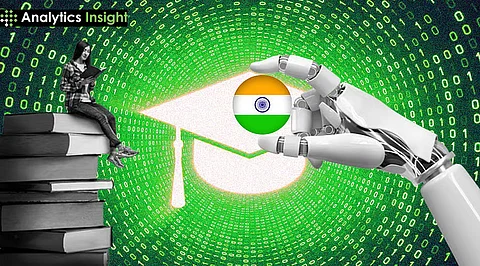

India's education system, so deeply rooted in traditional practices, is on the verge of a technological revolution. By 2025, artificial intelligence will reimagine classrooms, pedagogy, and learning experiences in India.
In urban cities in rural villages, AI brings more intelligent learning approaches that make education more interactive and accessible. This article discusses the revolutionary effect of AI in Indian education, its instruments, advantages, and difficulties.
AI crafts learning to fit each student’s unique needs, sparking a game-changer for India’s varied young minds. Smart platforms study how students grasp ideas and shape lessons to match their pace and style.
For instance, a weak mathematics student is given additional practice problems, whereas an apt student is given difficult material. The individualization by such platforms as BYJU'S or Embibe does not let anyone lag behind. By the year 2025, such systems become even more intelligent and help students of city schools and village schools learn things properly.
Distance no longer limits learning, thanks to AI-powered virtual classrooms. Video platforms with smarts connect remote students with effective teachers. Live translation and speech recognition tools narrow the language divide, which is critical in a 22-official-language country.
AI also made attendance automatic and monitored progress, freeing teachers to teach. By 2025, initiatives like India's DIKSHA portal grew, reaching digital classes to millions, especially to marginalized communities.
Teachers are significantly empowered by the potential of AI. The time-consuming marking of assignments is completed quicker through computerized tools that mark quizzes and essays with accuracy. Suggestions regarding instructional strategies from student performance data are also provided by AI applications, thus facilitating instructors to transform their strategies.
AI-based professional development courses provide teachers with individually crafted training, thus making them more robust. By 2025, these developments will empower educators, particularly in rural schools with staffing shortages, to deliver high-quality instruction with reduced stress.
India's urban-village education divide remains an issue, but AI diminishes it. Mobile apps and low-cost devices bring classes to distant schools. AI-based chatbots serve as virtual teachers, answering students' queries since they lack instructors to direct them.
Government initiatives like the National Education Policy 2020 are aligned with AI technology to develop a strong digital framework. Such initiatives, through which education becomes more inclusive and where rural students can compete on a larger platform by 2025.
AI gets students future-ready by making practical skills its emphasis. The emphasis in AI-infused curriculum is on programming, data science, and logic. Virtual laboratories simulate real setups to allow the student to learn by doing, or practicing engineering or scientific functions. Industry-school partnerships, like Microsoft's AI boot camps, make new subjects in studies.
Despite being promising, education AI has hurdles. It is costly to implement, limiting availability in low-income communities and opening the door to a digital divide. Data privacy is an issue, as students' information collected by AI systems needs to be kept secure. Over-reliance on technology may erode human interaction, a critical element of learning.
Cultural resistance in traditional schools to digital methods is also present. These issues must be resolved through effective planning, robust policies, and affordable solutions by 2025 to make AI available to all.
The implementation of AI in the educational system of India is a risky step towards inclusiveness and modernity. With learning personalization, teaching assistance, and bridging gaps, AI revolutionizes knowledge transmission to learners. Government and private sectors offer their support, and 2025 is the benchmark year.
There are challenges, but the resolve to empower crores through wise schooling surmounts them. As AI gains strength, Indian classrooms are now poised to raise a generation able to meet an evolving, technology-driven world.
